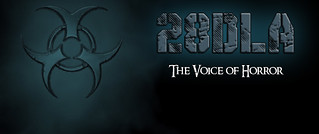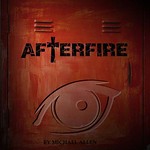When writer Harrison Smith was a young boy, sent to live with his grandparents at a farm because of issues in the homestead, there was more than just one lone isolated incident that would terrify him. This tale was told many times in a classroom, and a suggestion from a student would inspire the then instructor to pursue turning this idea into The Fields, a film now available on Blu-ray and DVD.
Like a corn kernel, the concept would germinate into a one huge plant that would symbolize a nation. The allusions to what the 70’s meant to those people who grew up in this era are very prominent. And the reference to the Manson Murders was more of a setting, a placeholder for suggesting what is to come.
“Obviously it was not Charles Manson outside the window or in the fields,” reveals Smith, “but that was the real monster at the time. He underscored the importance of the end of the social utopia movement which didn't really provide any solid solutions to the issues plaguing America in the late 60's and early 1970's.”
This film is is made to look at how a family comes together in the face of diversity. The product is more about the loss of innocence than experiencing terror. Here, the horror has no face. Despite a heavy interest in monster movies that developed in Smith’s youth, from watching the classics on television and film, this producer says he does not want to be known as the “horror guy.” He did not intend to make a truely horrorific film. Instead he wanted to show the perceptions his cinema counterpart, Stevie (Josh Ormond), experienced when both saw dark terrible things that went bump in the night. One of them includes Stevie seeing his dad point a rifle at his mom in the opening act.
But in a movie that is set in the countryside of Pennsylvania, there is another ideology this producer wanted to project. The cornfields, the farm, and the set design in The Fields represent a world long forgotten. It was one, where some viewers may recall the threat of nuclear war, but there were other fears instilled during this turbulent time. The Manson Murders pale in comparison to other problems that plagued America, like Watergate, Vietnam and the JFK assassination.
“In my opinion, the heartland has come to remind us of mainstream America,” says Smith, “It physically symbolizes the American ability to dream with its wide vistas, landscapes and endless rolling plains...that something is out there...perhaps hope...that keeps us going forward. “
But when that world that comes crashing down, just where can Stevie go? He’s told not to go wandering through the cornfield, but yet he does. After what he has witnessed, he has issues to deal with and that is symbolized by how he perceives the world. Just exactly what are his feelings towards his dad, Barry (Faust Checho), and why is his mom, Bonnie (Tara Reid) boozing it up? And who is this mysterious ringmaster figure?
“The night terrors experienced were not all that bad as it was a different time,” recalls Smith. “Many kids are over-protected today, doped up on too many drugs in the world of the anti-drug campaigns and therapy instead of good parenting.”
To depict the experiences that Stevie faced was also difficult.
Smith reveals that the directors had a good grasp on showing the film from a child's point of view, going as far as to design scenes for the camera to shoot from that aspect. When reflecting upon the difficult choices in casting, Smith says that his grandparents were played most accurately. The performance from Cloris Leachman is to be commended. Smith believes Leachman was spot on, and in fact channeled her.
Stevie’s parents are very loosely based on Smith’s family and Stevie is a reflection of Smith’s own experiences. Josh Ormond did a good job in simply being a kid, but casting any child actor can be tough, especially if a film is going to be a slight reflection of a real life incident.
“Josh was natural,” says Smith, “He's just a good natured, roll with the punches kinda kid. He's a great actor but most of all he is a nice person and I think that comes through clearly in the film and in the behind the scenes materials.”
The Fields fan page:
The Fields on Facebook
| | |
Advertise Here - Contact me Michael Allen at 28DLA
Subscribe to 28 Days Later: An Analysis Email Subscription
Like a corn kernel, the concept would germinate into a one huge plant that would symbolize a nation. The allusions to what the 70’s meant to those people who grew up in this era are very prominent. And the reference to the Manson Murders was more of a setting, a placeholder for suggesting what is to come.
“Obviously it was not Charles Manson outside the window or in the fields,” reveals Smith, “but that was the real monster at the time. He underscored the importance of the end of the social utopia movement which didn't really provide any solid solutions to the issues plaguing America in the late 60's and early 1970's.”
This film is is made to look at how a family comes together in the face of diversity. The product is more about the loss of innocence than experiencing terror. Here, the horror has no face. Despite a heavy interest in monster movies that developed in Smith’s youth, from watching the classics on television and film, this producer says he does not want to be known as the “horror guy.” He did not intend to make a truely horrorific film. Instead he wanted to show the perceptions his cinema counterpart, Stevie (Josh Ormond), experienced when both saw dark terrible things that went bump in the night. One of them includes Stevie seeing his dad point a rifle at his mom in the opening act.
But in a movie that is set in the countryside of Pennsylvania, there is another ideology this producer wanted to project. The cornfields, the farm, and the set design in The Fields represent a world long forgotten. It was one, where some viewers may recall the threat of nuclear war, but there were other fears instilled during this turbulent time. The Manson Murders pale in comparison to other problems that plagued America, like Watergate, Vietnam and the JFK assassination.
“In my opinion, the heartland has come to remind us of mainstream America,” says Smith, “It physically symbolizes the American ability to dream with its wide vistas, landscapes and endless rolling plains...that something is out there...perhaps hope...that keeps us going forward. “
But when that world that comes crashing down, just where can Stevie go? He’s told not to go wandering through the cornfield, but yet he does. After what he has witnessed, he has issues to deal with and that is symbolized by how he perceives the world. Just exactly what are his feelings towards his dad, Barry (Faust Checho), and why is his mom, Bonnie (Tara Reid) boozing it up? And who is this mysterious ringmaster figure?
“The night terrors experienced were not all that bad as it was a different time,” recalls Smith. “Many kids are over-protected today, doped up on too many drugs in the world of the anti-drug campaigns and therapy instead of good parenting.”
To depict the experiences that Stevie faced was also difficult.
Smith reveals that the directors had a good grasp on showing the film from a child's point of view, going as far as to design scenes for the camera to shoot from that aspect. When reflecting upon the difficult choices in casting, Smith says that his grandparents were played most accurately. The performance from Cloris Leachman is to be commended. Smith believes Leachman was spot on, and in fact channeled her.
Stevie’s parents are very loosely based on Smith’s family and Stevie is a reflection of Smith’s own experiences. Josh Ormond did a good job in simply being a kid, but casting any child actor can be tough, especially if a film is going to be a slight reflection of a real life incident.
“Josh was natural,” says Smith, “He's just a good natured, roll with the punches kinda kid. He's a great actor but most of all he is a nice person and I think that comes through clearly in the film and in the behind the scenes materials.”
The Fields fan page:
The Fields on Facebook
| | |
Advertise Here - Contact me Michael Allen at 28DLA
Subscribe to 28 Days Later: An Analysis Email Subscription


 Saturday, May 05, 2012
Saturday, May 05, 2012
 Edohotep
Edohotep




 Posted in:
Posted in: 


0 comments:
Post a Comment